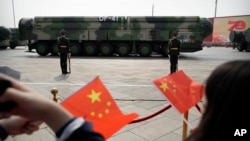China is spending a slightly larger share of its budget on defense for 2023, according to a draft budget presented to its annual parliamentary session Sunday, in what analysts say has been part of the government’s steady climb to become a regional military power.
China will boost defense spending by 7.2% this year, on top of last year's 7.1% increase, according to a draft budget submitted by the Ministry of Finance to the National People’s Congress. That marks the eighth consecutive year of single-digit percentage-point increases in what is now the world’s second-largest military budget.
The national budget showed $224 billion allocated to military spending, according to the draft budget. As in previous years, no breakdown of the spending was given. Between 2011 and 2015, China reported national defense budget increases each year from 10% to 12%.
China’s economic and defense numbers are viewed skeptically by many outside analysts who doubt the authoritarian government’s candor on sensitive topics.
Last month, CIA Director William Burns said in an interview that U.S. intelligence shows Chinese President Xi Jinping has instructed the military to “be ready by 2027” to invade Taiwan, although Burns said Russia’s experience in Ukraine may be giving Beijing doubts about the plan.
Chen Daoyin, a former associate professor of political science and law at Shanghai University currently living abroad, noted that the increase in military spending is slightly higher than the government’s economic growth target of around 5%, but says that it is “normal,” given China’s military aspirations.
“It is a goal for the Communist Party to strengthen the military, as it aspires to become a regional military power with a goal to boost its influence in the world,” he said.
Wen-Ti Sung, a political scientist at the Australian National University, said China’s budget increase was influenced by three factors.
“Russia's struggles during the Ukraine war likely provides significant data on the shape of contemporary warfare and what areas of improvement China's army still needs to make. This is particularly pressing because [China President] Xi Jinping's 'double centennials' discourse explicitly makes 2027 the year of China becoming a true world-class military power,” he said.
He said the military spending may also be part of China’s post-COVID economic recovery plan in boosting employment in the civilian sector.
“For Taiwan and other powers, this defense buildup does not necessarily have to be a dangerous signal,” he said. “It could mean China is in the phase of military capability-building, rather than putting that military power to immediate use.”
Comparing to US defense spending
Beijing’s annual military spending is still believed to be smaller than the U.S. defense budget, which in 2023 stands at around $797 billion, excluding supplemental funding for Ukraine and other appropriations.
China continues to push for contested maritime territorial claims with its neighbors in the South China Sea and Beijing’s military jets regularly fly through Taiwan’s air defense zone. Beijing also faces escalating trade and diplomatic disputes with the United States following recent spy balloon allegations and U.S. export restrictions on some high-tech products.
CIA Director Burns said last month that the risks of China using force “probably grow the further into this decade you get and beyond it, into the following decade as well.”
Chinese state media continue to publicly portray the government as merely pursuing defensive policies while others hype Beijing as a threat.
“China will never seek hegemony, expansion, or sphere of influence,” Xinhua wrote. “This is in stark contrast to the United States… In recent years, the U.S. average annual military budget has accounted for over 40% of the world's total.”
Wang Chao, spokesperson for the National People's Congress, told a news conference a day before that China's defense spending increase has been kept basically stable for many years as a share of gross domestic product.
"The modernization of China's military will not pose a threat to any country," he said.
Outgoing Chinese Premiere Li Keqiang, in his final government report issued before stepping down, however, stressed that the country should “strengthen military training and preparation for war” and enhance military strategy and capabilities, with the goals of the centenary of the People’s Liberation Army in 2027 in mind.
“We insist on the (Communist) party’s absolute leadership of the people’s army,” he said. “The military training and preparation for war have been further promoted, and the level of modernization and combat capabilities have been significantly improved.”
Li said China’s GDP growth last year was 3% and set a new target of “around 5%” for 2023. He stressed that China has experienced “five extremely unusual years” and acknowledged that economic development has been hamstrung by the COVID-19 pandemic and many “unexpected domestic and external factors,” but vowed the economy remained “resilient.”






